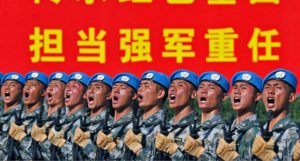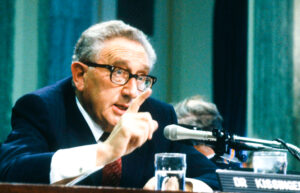I was privileged to know Henry Kissinger for over two decades, having dinner at his weekend home in Kent, Connecticut, several times a year since 2000, except for the period of the pandemic, when we spoke on the phone or via Zoom. What brought us together was an Atlantic essay I wrote in June, 1999 about his first book, A World Restored, dealing with the post-Napoleonic peace treaties. We met for the first time several months after that piece was published.
Once we became friends I did not write comprehensively again about Kissinger, except for one long tribute to his career, meant as an obituary, which The Atlantic decided to publish upon his 90th birthday in May, 2013. Between that piece, and the superior work on Kissinger’s life and thoughts published by Niall Ferguson, Barry Gewen, and Martin Indyk, I have little to add, except for personal reminiscences of dinner discussions, with Kissinger calling on his several guests to offer their opinions of the great issues of the day — and then replying to them.
At Kissinger’s dinner parties, organised by his brilliant and formidable wife Nancy, whose own presence filled the room, the headlines were often ignored. Discussions ranged from the historic dilemmas of China, Germany, Russia, and the United States to the challenges of the universities to the attributes of great leaders. You got a preview of his later books by being in his presence.
But I think it necessary here to reprise some of my interpretations of his philosophy which I find so crucial — enough so that they bear repeating from my previous essays. For it is Kissinger’s philosophy that I find most important about him, and which constitute a rough guide to his statesmanship: because it is a philosophy whose origins lay in his experiences as a young Jew in Hitler’s Germany and as the son of immigrants in challenging circumstances.
In fact, Kissinger had internalised the lessons of the Holocaust, though they were different lessons from those learned by the liberal elite of his era. Kissinger saw Hitler as a revolutionary chieftain who represented the forces of anarchy attempting to overthrow a legitimate international system, as imperfect as it was. For in Kissinger’s mind, his first book about the diplomatic response to another revolutionary chieftain, Napoleon, offered a vehicle for him to deal, albeit obliquely, with the problem of Hitler. Morality and power couldn’t be disentangled, in Kissinger’s mind.
In fact, Kissinger, as a practitioner at the highest levels of US foreign policy during some of the hardest days of the Cold War, thought more deeply about morality than many self-styled moralists. And the ultimate moral ambition during that period was the avoidance of a direct military conflict between the United States and the Soviet Union through a favourable balance of power. The Cold War may now seem ancient, but for someone like myself, who as a journalist covered Communist Eastern Europe, with all its grim, freeze-frame poverty and pulverising repression, it will always remain quite vivid. And were it not for Kissinger’s realpolitik, which allowed for a truce with China in order to balance against the Soviet Union, even as he and President Richard Nixon achieved détente with the Kremlin, President Ronald Reagan would never have had the luxury of his subsequent Wilsonianism.
Indeed, Kissinger was a realist internationalist, like the other great Republican secretaries of state during the Cold War, George Shultz and James Baker III. Realists today have drifted toward neo-isolationism, and have grown literally smaller because of it.
Kissinger’s beliefs, which emerge through his writing, are certainly not for the faint-hearted. They are emotionally unsatisfying, yet analytically timeless. They include:
- Disorder is worse than injustice, since injustice merely means the world is imperfect, while disorder tempts anarchy and the Hobbesian nightmare of war and conflict, of all against all.
- It follows, then, that order is more important than freedom, since without order there is no freedom for anybody.
- The fundamental issue in international and domestic affairs is not the control of wickedness, but the limitation of self-righteousness. For it is self-righteousness that often leads to war and the most extreme forms of repression, both at home and abroad.
- The aim of policy is to reconcile what is just with what is possible. Journalists and freedom fighters have it easy in life since they can concern themselves only with what is just. Policymakers, burdened with bureaucratic responsibility in order to advance a nation’s self-interest, have no such luxury.
- Pessimism can often be morally superior to misplaced optimism. Pessimism, therefore, is not necessarily to be disparaged.
It is true that much of the above is derivative of the great philosophers, especially Hobbes. But it is to Kissinger’s credit that he consciously activated it in the daily conduct of foreign policy.
Of course, Kissinger continues to be hated because of Vietnam. But as strange as it may seem, Kissinger and Nixon, in withdrawing from Vietnam in the bloody manner that they did, demonstrated real character: they believed that they were serving the national interest and proving their toughness to China and the Soviet Union, even as they knew they would be vilified in the media, in all the books written by liberal historians, and in the opinion polls for acting thus.
Their bloody and methodical withdrawal in the face of liberal demands for total and immediate capitulation and a conservative flight from reality (a belief in fighting till victory) had a demonstrable effect in terms of America’s reputation for power in China, the Soviet Union and the Middle East. For Nixon and Kissinger’s foreign policy was all of a piece. You cannot disentangle Kissinger’s brilliant peace-making in the Middle East from his actions in Indochina. Nevertheless, the withdrawal from Vietnam was still faster than De Gaulle’s from Algeria, for which the French leader has been lionised by historians.
As for the judgment of history, Kissinger’s own memoirs, with all of their faults, are vaster, more elegantly written, and far more intellectually stimulating than those of any other American statesman of the period. Kissinger may not have the last word, but he will have something close to it.
Kissinger was a “genuine statesman”, to use the German philosopher-historian Oswald Spengler’s definition: that is, he was not a reactionary who thought that history could be reversed, nor was he a militant-idealist, who thought that history marched in a certain direction. Kissinger’s conclusion was more grounded: he believed less in victory than in reconciliations.
Disclaimer
Some of the posts we share are controversial and we do not necessarily agree with them in the whole extend. Sometimes we agree with the content or part of it but we do not agree with the narration or language. Nevertheless we find them somehow interesting, valuable and/or informative or we share them, because we strongly believe in freedom of speech, free press and journalism. We strongly encourage you to have a critical approach to all the content, do your own research and analysis to build your own opinion.
We would be glad to have your feedback.
Source: UnHerd Read the original article here: https://unherd.com/



